Each month, Daniel Haeusser reviews short works of SFT that appear both online and in print. He is an Assistant Professor in the Biology Department at Canisius College, where he teaches microbiology and leads student research projects with bacteria and bacteriophage. He’s also an associate blogger with the American Society for Microbiology’s popular Small Things Considered. Daniel reads broadly in English and French, and his book reviews can be found at Reading1000Lives or Skiffy & Fanty. You can also connect with him on Goodreads or Twitter.
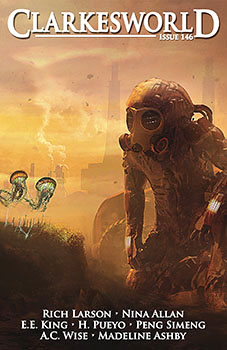 “The Love Letters” by Peng Simeng, translated from the Chinese by S. Qiouyi Lu
“The Love Letters” by Peng Simeng, translated from the Chinese by S. Qiouyi Lu
Clarkesworld Magazine Issue 146, November 2018
Although I’ve read this fairly recently, I had to go back and reread it because I had completely forgotten everything about it – not necessarily a good sign. The short story is set on an asteroid that would be unremarkable if it were not just one digit off in its identification number from that of Earth. The result of numerical mix-ups: the asteroid is covered with misdelivered interstellar message capsules. Among those: letters from one Hushan (on a mining expedition) to a ‘dearest’ Persephone. In re-reading this piece I am in a better mood now to appreciate the beauty of the language, something that does effectively capture the tone in which love letters are penned. However, the plot and the slight twist in the ending regarding Hushan’s identity still don’t resonate with me.
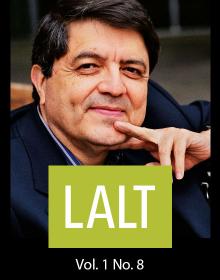 “A Portuguese Ghost” by Miguel Gomes, translated from the Spanish by Katie Brown
“A Portuguese Ghost” by Miguel Gomes, translated from the Spanish by Katie Brown
Latin American Literature Today, Vol. 1 No. 8, November 2018
One of the runners-up for our “Favorite SF in Translation” poll. Oddly the winner and both runners-up were short stories this month from related publications. In this story, the ghost of the father’s narrator appears to the family three days following his death, existing as if nothing has changed. This small hint of magical realism allows the story to address sociopolitical themes surrounding the exile and immigrant experience across generations. In this case, the Portuguese in Venezuela. In a nice touch the Portuguese text is left original with translations of these in brackets – presumably as it also had appeared in Spanish. It also concludes with perceptive observations that we often only listen well after conversations have been had, and that sometimes, complaints and the lack of a home are eternal conditions.
“City X: A Novel in 101 Tweets” by Alberto Chimal, translated from the Spanish by Sara Caplan, Rita Correa, Mónica Bravo Díaz, Rachel Echeto, Emily Gilmore, Lauren Hammer, Hannah Mitchell, Matthew Mogulescu Ross, & LaTasha Weston
Latin American Literature Today, Vol. 1 No. 8, November 2018
The short story winner of our “Favorite SF in Translation” poll, this story was originally live-tweeted in October 2018. At first this seemed a gimmicky endeavor, but as usual I appreciated a theme that is common in what I’ve read from Chimal, outsiders looking in at a population experiencing catastrophe. In this case there is the added layer of witnessing something that you are powerless to alter, not unlike the effect that reading bad news rolling through a Twitter feed may have on a person. The really cool aspect to the story here is the method of its rendering into English – a graduate school group exercise in translation.
“Kan/Trahc” by Iliana Vargas, translated from the Spanish by Adrian Demopulos
Latin American Literature Today, Vol. 1 No. 8, November 2018
This issue of Latin American Literature Today includes several stories from A Larger Reality: Speculative Fiction from the Bicultural Margins, a Mexicanx Initiative Anthology. This short story is one of several translated pieces from the collection – and indeed all are translations into one tongue or another, as the anthology is freely available in both English and Spanish versions. Along with other Skiffy & Fanty contributors, I discussed it on a recent Reading Rangers podcast episode. This story is not among those that were our favorites, but it is not without merits. It is at times challenging in format and language as it shows a protagonist going through a medical procedure with unrealized side effects. During this the protagonist loses coherence and their ability to process – communicate – language, which allows the author to do inventive textual experiments. Whether the events described a process of fragmentation through death or the dead being defragmented – or both – is still unclear to me. But it does illustrate how one might regret things agreed to in moments of desperation, without reading the relevant contract of agreement.
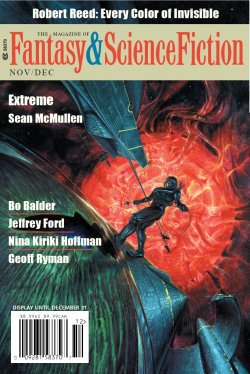 “The Iconoclasma” by Hanuš Seine, translated from the Czech by Julie Novakova
“The Iconoclasma” by Hanuš Seine, translated from the Czech by Julie Novakova
The Magazine of Fantasy & Science Fiction, Vol. 135 Nos. 5 & 6, November/December 2018
Like the technology it features, this novelette has both a positive and negative side to it. The speculative angle of the icons is fascinating and trippily inventive. Icons are hand-drawn “topological singularities” consisting of a “positive feedback loop” approaching an infinite limit. They are mathematical and physical technology transcending universes that allow humanity to travel the galaxy. But they are also lifeforms, and spawn negative singularities (iconoclasma) of monstrous destructive force in our reality. Cool, huh? A hard SF premise that can be used by the author to tell a fantastic entertaining space opera tale. However, the price of this cool idea is that it becomes difficult to relate to the reader, and with a multi-POV approach, the story becomes clunky and prone to info-dump that will put off some. For me it wasn’t a huge problem as the weird nature of the story and consistent passages of action made it work. At its heart the story is also about how technologies can have both benefits and terrible, terrible costs, but people can use intellect to find ways to minimize or prevent those costs from taking a toll.
 “Returning” by Susana Vallejo, translated from the Spanish by Lawrence Schimel
“Returning” by Susana Vallejo, translated from the Spanish by Lawrence Schimel
Cascadia Subduction Zone, Vol. 8 No. 4, November 2018
Flash fiction of an astronaut on an extraterrestrial world, packing her belongings and the samples she has collected to return to Earth. She ponders the memories of sights and smells of her home planet, and considers how things will have changed over the many years that have passed due to the relativity of long-distance space travel. And she considers how she will now be a lauded relic to her fellow humans, but still a relic. A beautiful short take on thoughts of what makes something home, but also a melancholy consideration of post-achievement old age.
 “A Tomato’s Last Good Deeds” by Getsl Selikovitch, translated from the Yiddish by Michael Shapiro
“A Tomato’s Last Good Deeds” by Getsl Selikovitch, translated from the Yiddish by Michael Shapiro
In Geveb, November 2018
A humorous little tale relating the last moments in the ‘life’ of a tomato, from its point of view. Where things are going are predictable from the very start, however.
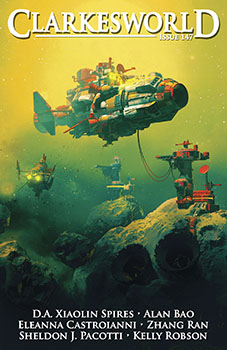 “Master Zhao: The Tale of an Ordinary Time Traveler” by Zhang Ran, translated from the Chinese by Andy Dudak
“Master Zhao: The Tale of an Ordinary Time Traveler” by Zhang Ran, translated from the Chinese by Andy Dudak
Clarkesworld Magazine Issue 147, December 2018
A brilliant story that gets more engrossing with each section and demonstrates that an ability to foresee the future might actually make one less confident about what is going to happen, and perhaps more uncertain about the present. The titular Master Zhao delivers food promptly each day to Master Zhang, and they share brief, friendly chit-chat. Master Zhang begins to notice that Master Zhao behaves somewhat peculiarly, and seems able to predict little random events. Soon Master Zhao confides in Master Zhang that his mind travels ahead of his body to experience possible futures, before returning to what he thinks must be a main-timeline present day. This ability seems also to be linked to his relationship with his terminally ill wife. Identified as time travel in the title, the story also refers to alternate universes as perhaps being more a propos, but in either case the story is a beautiful take on the themes. Though a bit long overall the story contains fascinating conversations on the complexities of what may be occurring to Master Zhao, and the implications. The writing is also an interesting combination of polite, formal language with conversational, relaxed speaking.
 “Us and Them” by Swylmar dos Santos Ferreira, translated from the Portuguese by Toshiya Kamei
“Us and Them” by Swylmar dos Santos Ferreira, translated from the Portuguese by Toshiya Kamei
Aphelion Webzine Issue 235, Volume 22, December 2018/January 2019
Flash fiction where aliens punish humanity by taking all other forms of animal life. Ultimately about how harsh treatments can just breed more harsh treatments to/from all. But, the story has some issues in vagueness of how these punishments would actually work or exactly do.
![]() “Fluxless” by Mike Jansen, translated from the Dutch by the author
“Fluxless” by Mike Jansen, translated from the Dutch by the author
Samovar, December 2018
With the author and the translator of this piece being one and the same, it isn’t clear to me whether this was first written in Dutch or English. If it’s in the mind of the writer, does it go both ways? Well… regardless, Jansen has written an enjoyable and intriguing story set in a future where ‘the Wilding’ has left pockets of humanity vulnerable to a combination of nano- and bio-tech. People are protected only by ‘fluxer’ technology that can inactivate the ‘phage’ that threaten to consume their bodies. Abandoning the wishes of her community to stay and help repopulate, protagonist Tanmee constructs a flying bike to travel to a former German institution where the key to adapting and starting over in this new world might lie. Jansen writes excellent descriptions and I like how the world seems to be something very new – yet still with specific detailed memories of the past. The biological aspects to the story also resonated with me, although the use of terms that currently mean one thing, but may be being used differently within this story created some issues (e.g. antibiotics and viruses.)
“The Price of Eternity” by Laura Quijano Vincenzi, translated from the Spanish by Jerry L. Robinette
Samovar, December 2018
“Mr. Andrés Batista did not believe in ghosts. Nor in premonitions, curses or witchcraft. He was interested only in bare facts.” Magical realism seems a commonly integral component to Latin American literature, so much so that ‘fantasy’ as a genre blends indistinguishably with the contemporary mainstream. This opening thus really stuck out to me with this character of Batista, who “considered it an insult to human intelligence to believe in tawdry superstitions.” Of course, Vincenzi has her protagonist then encounter a ghost, the specter of a man still revered around town for an act of heroism. But Batista has long been suspicious of that heroism, and the disappearance of the town drunk on that same day past. Exploring the themes of truth and justice, Vincenzi uses the captivating character of Batista to give an ironic twist to that classic story of a ghost doomed to wander in penance, until some truth is publicly acknowledged.
![]() “Paper Men” by Denis Álvarez Betancourt, translated from the Spanish by Toshiya Kamei
“Paper Men” by Denis Álvarez Betancourt, translated from the Spanish by Toshiya Kamei
Unfit Magazine, December 2018
The story relates what has occurred when the titular creatures of uncertain origin arrived and attacked humankind. However, the details given appear contradictory: they are similar to us in form and speech, and ‘insert’ into our lives, but can be blown about by the wind and disperse as spores filled with ‘microscopic proto-men’. Their appearance passes within a year with no explanation, though some remain. There is certainly some symbolism here as humanity tries futilely to deal with a perceived threat that scatters like dust upon assault. The absurdity of the plot and the authorial tone also give a touch of humor.
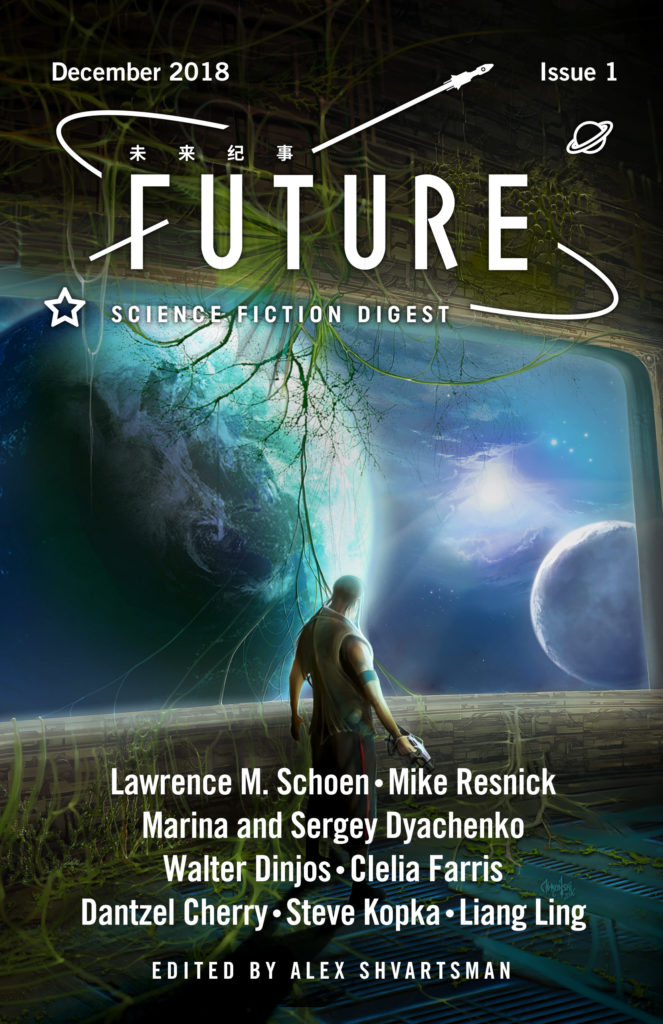 “The Emperor of Death” by Marina and Sergey Dyachenko, translated from the Russian by Julia Meitov Hersey
“The Emperor of Death” by Marina and Sergey Dyachenko, translated from the Russian by Julia Meitov Hersey
Future Science Fiction Digest, Issue 1, December 2018
With a story written predominantly in simple, alternating dialogue, the Dyachenkos turn the ordinary into uncanny mystery. An investigator interviews a teen experimentally conceived and born on a ship while returning to Earth. Members of the ship began to die of similar, inexplicable symptoms soon after his birth. Years later the ship arrived to Earth with only the boy left alive. Now, people he has interacted with at school are dying as well. The inability of characters to accept that this boy might be the cause of something otherwise inexplicable is an interesting theme to the story, and its ending reveals a connection between the ship, the boy, and the investigator. However, the authors also leave much unresolved to maintain the overall haze of bizarre perplexity that tonally dominates the work.
“The Substance of Ideas” by Clelia Farris, translated from the Italian by Rachel Cordasco
Future Science Fiction Digest, Issue 1, December 2018
A young boy and girl who are friends explore a cave and lake that may or may not be the remains of a ship that once brought their ancestors to the planet they now call home. Though the leaders of the communal settlement don’t want them exploring this site, they discover star ‘pincushion’ creatures that when fed to a pet cause signs of days-long ecstasy in the animal. They soon begin selling the pincushions to people from a nearby town, not fully appreciating (or acknowledging) how it’s ability to inspire imagination and ideas in people comes with the side-effects of drug withdrawal, or thinking through what the townspeople might do to the community to get more product. The plot really allows exploration of the relationship between the two friends, the nature of telling stories that brush against the truth to influence and captivate others, and the errancies of youth. Beyond any of that, however, the story succeeds with beautiful, evocative prose that our host of this SF in Translation site has done a fantastic job rendering into English.
“Wordfall” by Liang Ling, translated from the Chinese by Nathan Faries and Zhao Li
Future Science Fiction Digest, Issue 1, December 2018
A story in the vein of classic science fiction in putting humans in a situation where they must make sense of an alien situation to come up with a clever resolution to challenge. Experiencing problems with their ship’s reactor furnace, a crew sets down on a snow-covered planet to make repairs. But their hopes of easily obtaining hydrogen from beneath the ice prove more difficult than expected, but encounters with native lifeforms may hold the key to their ability to continue the journey home. Ling’s story includes speculative elements such as software that permits the emotions of pets to be communicated with children, and the aliens obtaining energy by catching radioactive stones that fall from the sky. It also features a lot of positivity, with cooperation between groups and parents listening to the wisdom of childhood and conscience. A story about language, in translation, also has a nice recursive touch that one can appreciate.
